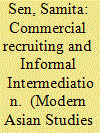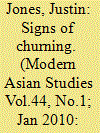|
|
|
Sort Order |
|
|
|
Items / Page
|
|
|
|
|
|
|
| Srl | Item |
| 1 |
ID:
099259


|
|
|
|
|
| Publication |
2010.
|
| Summary/Abstract |
That the transition to self-governance under a nation-state has not been accompanied by the greater focus on Indian citizens' welfare which many expected, has been the source of much confusion and disappointment. Looking at late-colonial debates about property rights under Hindu personal law, this paper seeks to explain why people assumed that independence could change the relationship between the state and Indian society, and also why this has not come about. It argues that, from the latter half of the nineteenth century, economic, social, and political changes placed pressure on the very hierarchical structures of joint-family patriarchy that colonial rule had hitherto depended on. Calls for family reform seemed, at certain moments, to critique patriarchal control and social order more generally, creating the intellectual space to rethink the place of women within the family, and the state more widely. Yet, while couched in the language of women's rights, underpinning these reform debates was an interest to change men's property rights and enhance their individual control over the family. Thus, the interwar years witnessed not just a breaking down of an old colonial patriarchal order, but also the establishment of a new, post-colonial patriarchy based around the authority of the propertied husband.
|
|
|
|
|
|
|
|
|
|
|
|
|
|
|
|
| 2 |
ID:
099225


|
|
|
|
|
| Publication |
2010.
|
| Summary/Abstract |
This paper engages with Rajnarayan Chandavarkar's argument that the importance accorded to the intermediation of sardars/jobbers in colonial labour arrangements followed from the perception of the Indian peasant as static and immobile, requiring especial effort at recruitment, but that, over time, employers grew resentful of the power and control acquired by these intermediaries. Drawing on this insight, the paper examines the role of sardars in the recruitment system of the Assam tea plantations and the ways in which they were promoted by the planters and the state in an attempt to loosen the stranglehold of professional contractors. The sardars were presented as the solution to abuses of Assam recruitment and portrayed as non-market agents recruiting within the closed world of kin, caste and village relationships. Towards the late-nineteenth century, however, a nexus developed between the contractors and sardars, which successive legislative interventions failed to break. Moreover, the notion that the sardar would be a more benign agent of recruitment was repeatedly proved false
|
|
|
|
|
|
|
|
|
|
|
|
|
|
|
|
| 3 |
ID:
099260


|
|
|
|
|
| Publication |
2010.
|
| Summary/Abstract |
This paper explores the development of multiple conceptions of citizenship in India in an attempt to understand how, despite profound social divisions, India's nationhood holds together. The paper advances the proposition that the Indian polity incorporated a deeply divided and conflict-ridden population by offering multiple notions of citizenship upon which a sense of membership in the nation, and a share in the enterprise of the state, could be sought. By negotiating and balancing distinct overlapping conceptions for competing membership claims in the nation, diverse social groups could find a viable place in the nation, without entirely resigning their various group identities. The analysis focuses as a lens on the Muslim citizens who are amongst the most excluded members in the whole body of Indian citizenry. It provides perspectives into how even some of the most marginalised members in Indian society found sufficient prospects for a meaningful participation within the nation. Multiple conceptions of citizenship enabled the state to manage its diverse social groups and contain many of their underlying conflicts.
|
|
|
|
|
|
|
|
|
|
|
|
|
|
|
|
| 4 |
ID:
099235


|
|
|
|
|
| Publication |
2010.
|
| Summary/Abstract |
This paper traces the evolution of the indenture labour system in the tea plantations of Assam and, simultaneously, the shaping of the attitudes of British planters towards the labour force. Also explored are: the significant fact that only a small number of British managerial personnel were in charge of a huge migrant labour force; how the need to step up tea production for the competitive world market while keeping down costs-i.e. labour costs, being the main production cost-fostered an exploitative labour system, with planters taking frequent recourse to physical and economic coercion; and the ensuing extra-legal measures needed to keep the labour force under control. The paper also demonstrates that the colonial state was in full cognizance of the injustices of the labour system. Legislation by the government had laid the foundations of the indenture system and, while there were provisions for protecting the interests of labour force, these were on the whole ignored, with the state turning a blind eye to the planters' use of physical and other extra-legal measures. One instance involved Chief Commissioner Henry Cotton, who attacked the injustices of the system. This attack was silenced swiftly, and the stance taken by Viceroy Curzon as the incident played out is a clear pointer to the government's willingness, to side with tea-industry interests at all costs.
|
|
|
|
|
|
|
|
|
|
|
|
|
|
|
|
| 5 |
ID:
099244


|
|
|
|
|
| Publication |
2010.
|
| Summary/Abstract |
Through a study of hitherto unexplored geography textbooks written in Bengali between 1845 and 1880, this paper traces the evolution of a geographic information system related to ethnicity, race, and space. This geographic information system impacted the mentality of emerging educated elites in colonial India who studied in the newly established colonial schools and played a critical role in developing and articulating ideas of the territorial nation-state and the rights of citizenship in India. The Bengali Hindu literati believed that the higher location of India in such a constructed hierarchy of civilizations could strengthen their claims to rights of citizenship and self-government. These nineteenth century geography textbooks asserted clearly that high caste Hindus constituted the core ethnicity of colonial Indian society and all others were resident outsiders. This knowledge system, rooted in geography/ethnicity/race/space, and related to the hierarchy of civilizations, informed the Bengali intelligentsia's notion of core ethnicity in the future nation-state in India with Hindu elites at its ethnic core.
|
|
|
|
|
|
|
|
|
|
|
|
|
|
|
|
| 6 |
ID:
099248


|
|
|
|
|
| Publication |
2010.
|
| Summary/Abstract |
The Congress, which had launched a satyagraha in 1930 to defy the Martial Law at Sholapur, had swept to power in the Bombay Presidency after the 1937 elections. However, once in power it started using a vocabulary of discipline in the industrial city. Its acceptance of power was greeted with a surge in labour activism led by the communists. The Congress initially relaxed many of the restrictions imposed by the earlier British administration and followed a strategy of accommodation. In a city like Sholapur, where government surveillance had increased following the violent popular unrest of 1930 in response to Mahatma Gandhi's call for Civil Disobedience, such temperate policies encouraged the articulation of submerged tensions, especially as the formation of a Congress government had raised expectations. Yet a combination of factors forced the ministry to adopt an uncompromising stance towards the labour activism of this period. Sholapur's turbulent record of unrest, the constraints imposed by class alliances, the trappings of labour recruitment from the criminal tribes settlement, the increasing influence of the communists, coupled with the bureaucracy and millowners' shared aversion to unbridled trade union activity, forced the ministry to adopt tougher disciplinary measures in the city. Therefore, when the labour agitation in Sholapur threatened to disrupt law and order, it brought about a shift in the government's response and the bureaucracy reasserted its power by reverting to repressive measures in the new Congress Raj
|
|
|
|
|
|
|
|
|
|
|
|
|
|
|
|
| 7 |
ID:
099246


|
|
|
|
|
| Publication |
2010.
|
| Summary/Abstract |
This paper examines themes related to cooking, food, nutrition, and the relationship between dietary practice and health in late-nineteenth century and early-twentieth century Bengal, and argues that food and cuisine represented a vibrant site on which a complex rhetorical struggle between colonialism and nationalism was played out. Insofar as they carried symbolic meanings and 'civilisational attributes', cooking and eating transcended their functionality and became cultural practices, with a strong ideological-pedagogical content. The Bengali/Indian kitchen, so strongly reviled in European colonialist discourses as a veritable purgatory, became a critically important symbolic space in the emerging ideology of domesticity during the colonial period. The gastronomic excesses of gluttonous British officials-crucial in asserting the physical superiority of a 'masculine' Raj-became an object of ridicule in Bengali culinary texts, signifying the grossness of a materialistic. The cooking and eating of food thus became deeply implicated in the cultural politics of bhadralok nationalism.
|
|
|
|
|
|
|
|
|
|
|
|
|
|
|
|
| 8 |
ID:
099261


|
|
|
|
|
| Publication |
2010,
|
| Summary/Abstract |
For many Muslims, the preservation of Muslim Personal Law has become the touchstone of their capacity to defend their religious identity in modern India. This paper examines public debate over Muslim Personal Law, not as a site of consensus within the community, but rather as an arena in which a varied array of Muslim individuals, schools and organisations have sought to assert their own distinctiveness. This is done by discussing the evolution of the All India Muslim Personal Law Board, the most influential organisation to speak on such matters since the 1970s, with particular focus on its recent disintegration at the hands of a number of alternative legal councils formed by feminist, clerical and other groups. These organisations have justified their existence through criticism of the organisation's alleged attempts to standardise Islamic law, and its perceived dominance by the Deobandi school of thought. In truth, however, this process of fragmentation results from a complex array of embryonic and interlinked personal, political and ideological competitions, indicative of the increasingly fraught process of consensus-building in contemporary Indian Muslim society.
|
|
|
|
|
|
|
|
|
|
|
|
|
|
|
|
|
|
|
|
|